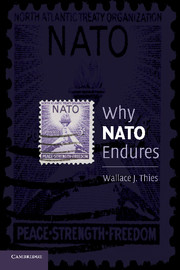Book contents
4 - Why NATO Is Different
Published online by Cambridge University Press: 05 June 2012
Summary
Alliances are as old as states themselves, but the way their members act toward each other has changed greatly over the past several centuries. The transformation of alliance members from rivals in an ongoing struggle for power and empire to partners sharing common interests and pooling armed forces has been the product of many factors, but in retrospect three stand out as especially prominent: changes in the scope and pace of warfare, changes in the distribution of power among the leading states, and the presence or absence of divisive ideological issues. The rate of change has been uneven rather than constant, but it is nonetheless possible to identify three periods in the evolution of alliance relationships, with significant differences among them in the behavior of states toward their allies.
THE TRANSFORMATION OF ALLIANCE RELATIONSHIPS
During the eighteenth century and for much of the nineteenth, the ability of states to increase their military power by mobilizing domestic resources was for the most part very limited, due to the underdeveloped state of military technology and the need to restrict the size of armies so as not to impede economic growth. The formation of alliances was thus the only way to quickly augment national power, but the all-against-all character of the struggle for power and empire meant that alliances were for the most part temporary, ad hoc affairs organized by states that had few interests in common and which sought to use each other to pursue their separate territorial goals.
- Type
- Chapter
- Information
- Why NATO Endures , pp. 120 - 139Publisher: Cambridge University PressPrint publication year: 2009



